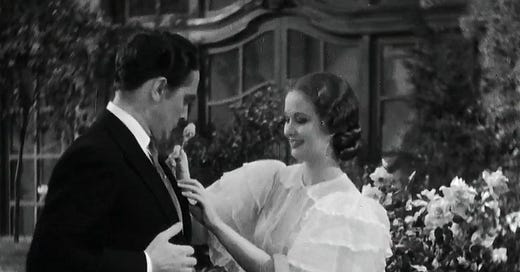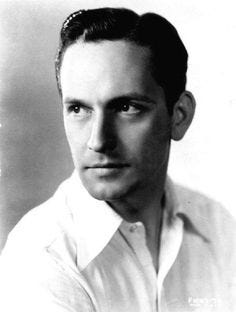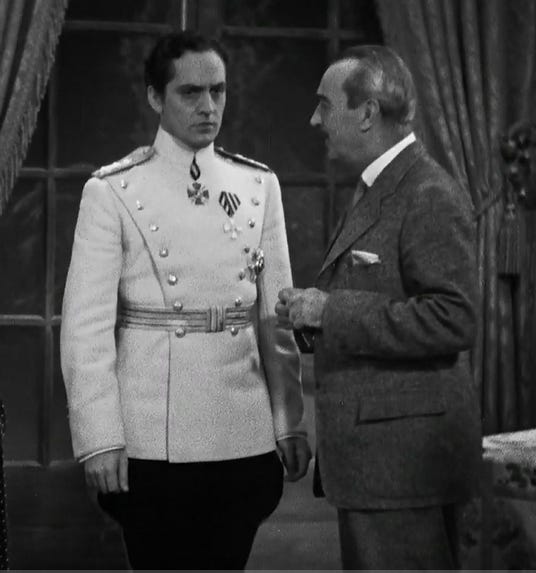Appreciating Death Takes a Holiday (1934)
Appreciating Death Takes a Holiday and the Actor who Enlivens the Role
This post is about Death Takes a Holiday, but it’s really about Fredric March, an actor who was most famous for his films in the 1930s and 1940s.
I’ve talked a little before about Cary Grant. Cary Grant is a class act, but Fredric March is a class actor. The greatest, not just of his time, but of any time. He is never slow or reserved, like some of the golden-age stars, or cold or stagnant, like some of the modern stars. He is always brimming with life and emotion. Occasionally one could argue that he overacts, that he overloads too much expression, but that’s a fault a film can survive. He always feels real.
The problem with Fredric March is that, despite being a favorite actor, I don’t have a specific film that I could call a favorite. Either the film is interesting but March doesn’t necessarily stand out, or the film’s main highlight is March’s performance. His consistency and ability to fit whatever role the film needs means he blends into good films and elevates bad ones. He showcases the film, not the other way around.1
But Death Takes a Holiday was the first performance of his I saw, so I’ll use that as an example.
March plays Death, who invites himself to stay at an Italian duke’s villa because he wants to know why people are so afraid of him. Flowers wilt when he holds them. His lifestyle is lonely. His response is to disguise himself as the foreign Prince Sirki (with accent) and experience a short-lived holiday from his job.
Despite the unique premise and imagery, Death Takes a Holiday falls under the category of films that I would not consider a personal favorite, though it is superior to all of its attempted remakes. Produced under Paramount and released in the pre-code era of film, it also marked one of the last films March was given under his acting contract with Paramount2.
I’ve started to realize that March consistently delivers two specific types of scenes. He is very good at appearing moonstruck, whether with love or delight, and he is very good at appearing indignant. Every film I’ve seen has offered him at least one incensed monologue and one moment of uncensored sensitivity.
His strengths serve him well in this particular role. As Prince Sirki, Death is caught up with the wonders of life and the possibilities of love, and both are shown through very simple moments.
Before going to bed during his first night as the prince, Sirki is introduced to Grazia, who he becomes fascinated by. He climbs a staircase and looks back no less than five separate times.
Some might call the movement overkill, but the effect is the equivalent to Cinderella descending the staircase at the ball. The woman who he will soon fall in love with stands at the bottom of the staircase, and he cannot help but continually look back at her as he ascends. The romantic gesture isn’t lost in the exaggeration of his repetition. To look at someone and feel there may be a possibility for something more, or even simply involve himself in the idea of connection—for Sirki, who has never encountered such a thing before, the moment is groundbreaking. He doesn’t waste his seconds when he turns around; he clings to the ones he has.
Sirki isn’t beholden only to love, however. It is the delight of small aspects of life which captivate him. In the morning, Grazia offers him a rose not yet in bloom, and he initially shies away, afraid that it will wilt. When it doesn’t, he can’t stop himself from continuing to touch the bud. He cannot stop admiring how they are allowed to exist in each other’s presence. Like a child who has discovered something new, he doesn’t tire from experiencing the same taken-for-granted beauty again and again. His small gestures and unabashed delight stuck with me long after I’d thought I’d left the film behind.
Of course, the scales must tip, and March’s tirades must begin. During the second half of the 79 minute film, Sirki realizes how bitter he is to return to his lonely life3. He still reasons against people’s fear of him (as death), but he understands his own reluctance to leave life behind—he has experienced love. Death, who never truly lived until his holiday, has realized his capacity to appreciate life. Now that he has discovered it, he cannot stand the thought of returning to his ways. In a film where grandeur has been built into its titular character, March being able to orate the grandiose language with all of the emotion he can stand is exactly what the character needs. His extremeness somehow solidifies the performance.4
Death Takes a Holiday is fine, but far from my favorite. I probably could have introduced March with something better-liked, like the 1937 iteration of A Star is Born5, or the 1931 Dr. Jekyll and Mr. Hyde6, or even the incredible 1946 drama The Best Years of Our Lives7. March acted in proto-screwballs, pre-code romances, westerns, biopics, political thrillers, fantasies, and science fiction films. He shared the screen twice with Cary Grant, and in one of them Cary Grant was the cameo8.
Death Takes a Holiday doesn’t excel for me the way those other films have. Certain scenes tread the line between pre-code fascinating and pre-code bizarre (a moment when the group discusses a suicide and Sirki takes a defensive stance may be in character, but it is strange to encounter such a scene at all), and although the film’s ending may be closer to a goth girl’s dream, it isn’t so much mine. Still, March’s strengths are Death Takes a Holiday’s strengths. March dissolves himself into his characters, and Death is among his best9.
After all, he rose to fame playing an impersonation of one of the greatest film stars of his own generation. In the 1930 film adaptation of The Royal Family on Broadway, he played about 12 minutes of Tony Cavendish, a blatant parody of John Barrymore. He was considered the highlight of the film.
During that era, actors generally signed under studios and were given films rather than going between studios and picking their own; despite this, March (who was given some pretty terrible films under the contract system) decided to freelance.
By this point, he has also somehow become used to cigarettes. 1930s films…
There are other scenes that portray him better, but “Do you threaten the stars because you dislike your destiny?” was too cold of a line to leave out.
Out of all the adaptations, the 1937’s catchphrase has the most style. I mean, compare the 1937’s “Do you mind if I take just one more look?” with all the later versions’ “I just want to take another look at you.” Where’s the class in that?
He performs both Jekyll and Hyde; to present the transformation on the monochrome screen, March wore monstrous make-up in different colors and the film used a camera with multiple colored filters. They removed a filter at a time to gradually reveal the monstrous visual. Technically very impressive, but more impressive is how differently he acts between the two characters. If you showed individual clips, I wouldn’t have believed they were the same actor. He won an Oscar for this—the only acting award granted by the Oscars for a science fiction film (until Everything, Everywhere, All at Once).
One of the best of his filmography, though I would consider him the third-most outstanding character of the three main leads. He won an Oscar for this one, too.
Which leads me to a conundrum. I want to write more about him, but I don’t want to be repetitive. I will likely post again on Fredric March somewhere down the line, but whether it ends up being an overview or ends up intertwined with another one of his movies…who’s to say.
It’s jarring to experience Death Takes a Holiday and then visit another film and be confronted with Ohio accent whiplash, but that’s part of the surprise that comes with watching a March film.








